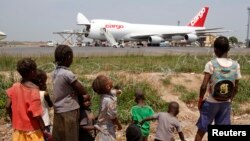GENEVA —
The World Food Program says it will fall far short of its goal of feeding four million people in the Democratic Republic of Congo this year because of a severe funding shortage. It also warns it will have to drastically cut its current programs unless international donors respond to its appeal.
The World Food Program has been low on cash for some time. Last year, it cut food rations across the board for all its beneficiaries in the Democratic Republic of Congo. It also scaled back some other activities in hopes of salvaging most of its humanitarian operation.
But, this has not worked. WFP said it expects to run out of food next month in most of the country.
Spokeswoman Elizabeth Byrs told VOA her agency will be forced to discontinue food aid except in the areas of greatest suffering.
“This is an heartbreaking decision, but without funding, we cannot buy the food. We cannot buy the 3,000 tons of specialized nutritional products for babies," she said. "We need 15,000 metric tons of food in the next six months to provide assistance in form of our cash and voucher programs. So, we will have to scale down all those programs, long-term programs, in-depth programs because of the lack of funding.”
The WFP appealed for $478 million to pay for humanitarian assistance in the DRC between July 2013 and December 2015. To date, it has received only 26 percent of this request.
The agency said it urgently needs $48 million to carry through its operations until August.
Currently, WFP is feeding 1.5 million people every month in DRC. It said it plans to increase that number to 2.2 million people this year. But that is nowhere near the 4.2 million people it had hoped to reach.
Because it is cash poor, Byrs said WFP will now focus its aid operations on the most vulnerable people.
“Those who suffer the most and the most are in need of life-saving assistance," she said. "And, we will cut rations and we will also scale down our school meal program and focus only on those children, for instance, who need the most urgent assistance, the most life-saving assistance.”
The narrowed feeding programs will target those who are internally displaced by conflict in Congo's eastern provinces, including Katanga, Orientale, and North and South Kivu, and the thousands of refugees from the Central African Republic.
Most of the 63,000 refugees are in northwestern Equateur province. Half of them are living in camps and are supported by WFP.
The World Food Program has been low on cash for some time. Last year, it cut food rations across the board for all its beneficiaries in the Democratic Republic of Congo. It also scaled back some other activities in hopes of salvaging most of its humanitarian operation.
But, this has not worked. WFP said it expects to run out of food next month in most of the country.
Spokeswoman Elizabeth Byrs told VOA her agency will be forced to discontinue food aid except in the areas of greatest suffering.
“This is an heartbreaking decision, but without funding, we cannot buy the food. We cannot buy the 3,000 tons of specialized nutritional products for babies," she said. "We need 15,000 metric tons of food in the next six months to provide assistance in form of our cash and voucher programs. So, we will have to scale down all those programs, long-term programs, in-depth programs because of the lack of funding.”
The WFP appealed for $478 million to pay for humanitarian assistance in the DRC between July 2013 and December 2015. To date, it has received only 26 percent of this request.
The agency said it urgently needs $48 million to carry through its operations until August.
Currently, WFP is feeding 1.5 million people every month in DRC. It said it plans to increase that number to 2.2 million people this year. But that is nowhere near the 4.2 million people it had hoped to reach.
Because it is cash poor, Byrs said WFP will now focus its aid operations on the most vulnerable people.
“Those who suffer the most and the most are in need of life-saving assistance," she said. "And, we will cut rations and we will also scale down our school meal program and focus only on those children, for instance, who need the most urgent assistance, the most life-saving assistance.”
The narrowed feeding programs will target those who are internally displaced by conflict in Congo's eastern provinces, including Katanga, Orientale, and North and South Kivu, and the thousands of refugees from the Central African Republic.
Most of the 63,000 refugees are in northwestern Equateur province. Half of them are living in camps and are supported by WFP.








